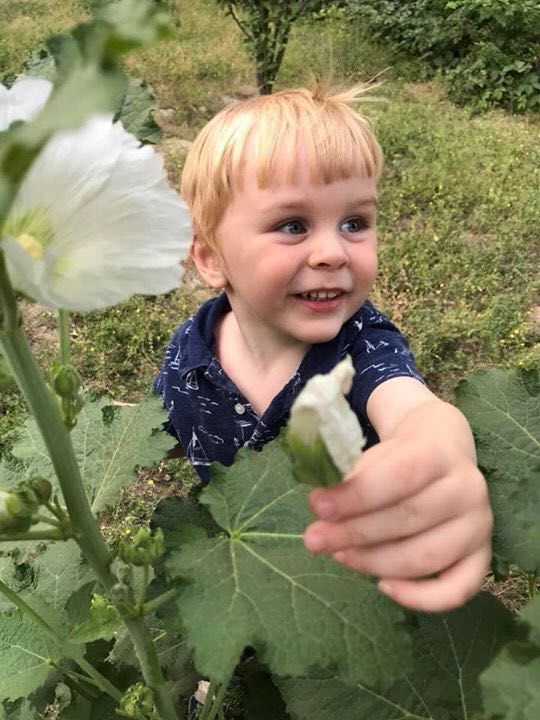老外在中国:学会同周围和世界对话
China Daily英文微信 2018-10-26 17:36

My 3-year-old son started to speak a while ago — but only recently in English.
不久前,我三岁的儿子开始讲话——但是他最近才开始讲英文。
Most Americans who encountered the blonde-haired, blue-eyed boy during his recent summer vacation in the rural United States figured he was babbling rather than attempting to converse with them in Mandarin.
前段时间他在美国乡下过暑假时,大部分美国人遇到这个金发碧眼的小男孩,都认为他只是在牙牙学语,未曾想过他在试图用普通话与他们交流。

Strangers in northern Michigan would hear me responding to Sagan and at least sometimes presumed we were foreign.
在北密歇根,陌生人会听我对萨根的回应,而且有些时候会以为我们是外国人。
Fair enough.
这也说得通。
But they were seemingly left guessing at what language we were using, since, when it comes to Chinese, we don’t look the part, to say the least.
但是,他们似乎会猜测我们讲的是哪种语言。因为退一步讲,我们的长相看起来不像中国人。
In other words, their eyes and ears would seem to disagree.
换言之,他们看到和听到的存在矛盾。
“So,” a few asked, “where are you from?”
一些人会问我们:“所以你们来自哪里呢?”
“Here,” I’d reply.
“就是这里,”我回答道。
Their question purposefully didn’t exclude the provided answer.
他们问的时候自然没有排除这个可能的答案。
I’d then explain we live in China where both kids were born and raised, and we were making our annual visit home to see family.
接着,我解释道,我们定居在中国,我的两个孩子都在那里出生长大。我们每年会回来探亲。
Their faces settled into nods, seemingly as much as an affirmation to themselves as to us.
他们点点头,似乎是对自己猜测的肯定,也是对我们的肯定。
“Well, that makes sense,” I imagined them thinking.
我猜他们一定会想:“这样就说得通了。”
Otherwise, it really wouldn’t make much sense in the woodsy communities we were visiting.
否则,在我们所到的北密歇根的这个森林社区,这实在不太合理。
Home.
这里是我们的家乡。
But understanding Sagan was still a guessing game for family members, who knew the rules but not how to play in his mother tongue.
但对我们的家人来说,听萨根说话就像是一场猜谜游戏,他们懂得游戏规则却不知道如何用他的母语表达。
“Wo xiang he nai! (I want to drink milk!),” Sagan would announce to my mom.
萨根会对奶奶说道:“我想喝奶!”
“Are you sleepy?” Grandma would reply in English.
奶奶会用英文回答道:“你是困了吗?”
“Hungry? Need a new diaper?”
“饿了吗?还是要换新的尿不湿?”
When she’d correctly guess, “milk?”, Grandma wouldn’t understand his affirmative response without translation.
就算奶奶猜对了是“牛奶?”,没有翻译的话,她还是不明白萨根接下来给她的肯定回答。
After two months in the US, including a birthday, Sagan returned to Beijing speaking English, mostly separately.
在美国待了两个月后(在此期间还过了个生日),萨根回到北京,开始零零碎碎地讲一些英文。
Still, days after we were reunited, he tugged my sleeve, pointed to the sky and declared: “Baba (Dad!), hai you yi ge (there’s another) airplane flying. Look!”
不过,在我们重新团聚的几天之后,他拽着我的袖子,指向天空,说:“爸爸,还有一个airplane flying(飞机在飞)。Look(你看)! ”
I’d just pointed the first out to him, using only English.
我刚刚指给他看了第一架飞机,当时我只说了英文。
His 7-year-old sister, Lily, also learned Chinese first and then mixed until she, also around 3, unglued the languages, both of which she speaks like a native.
萨根有一个七岁的姐姐莉莉,她也是先学会了中文,然后中英文混着讲。莉莉直到三岁左右才将两种语言分开。她的中英文都说得和本地人一样好。
The only deficiency in her Putonghua (standardized spoken Mandarin) is a Beijing accent in which growling er sounds unfurl the end of many syllables.
莉莉讲普通话时的唯一缺点就是有北京腔。北京腔会在很多音节后面带上儿化音。
Our family has made it a point to circumnavigate a regret many immigrant families in the US, including Chinese friends, repeated to us about raising their kids abroad — that is, allowing the parents’ native tongue to become antipodean.
不少在美国的移民家庭,包括一些中国朋友不止一次地提及,在国外抚养孩子的话,父母的母语将是孩子的外语。而我们家对此特别注意避开这一遗憾。
Or, at least, we’ve tried to.
或者说,我们至少尝试着去这样做了。
My wife, daughter and I sprinkle commonly used Chinese words into overwhelmingly English sentences at home.
我的妻子、女儿和我在家讲话时,会在大量英文句子中夹杂常用的中文词汇。
Sure, environment is part of the reason our kids picked up Chinese first.
当然,环境是我们的孩子先学会说中文的原因之一。
But another feature of the language seems to be a major underwriter — Mandarin is easier for beginning speakers to pronounce.
但是中文的另一个特征似乎是主要原因——对于初学者来说,普通话的发音更容易。
That’s because tykes who are just starting to talk initially can’t annunciate consonant sounds at the end of syllables. Putonghua has only three — n, ng and ’er — but most syllables instead end with vowels.
那是因为刚学说话的小孩子一开始不会在音节结尾处发辅音。而普通话中只有三个辅音——n,ng和er, 而多数音节都是以元音结尾的。
So, “horse” is nearly impossible for a nascent chatterbox to pronounce.
因此,对于一个牙牙学语的小孩来说,几乎不可能说出“horse”这个单词。
“HO’wuh” is about as close as our kids came, initially. That pesky “rse” ending kicked them in the lips.
“HO’wuh” 是小孩子一开始能发出来的音。 而麻烦的尾音“rse”难住了他们的嘴巴。
Ma? No problem.
那么“Ma”呢?这个发音完全没有问题。
But environment’s role in language acquisition recently became clearer as our daughter completed her first month of first grade in a local school.
不过,环境在语言习得中的作用最近更明显了,因为我们的女儿已经在当地学校读一年级有一个月了。
Her Chinese reading and writing will soon surpass her English.
她的中文阅读和写作水平将很快超过她的英文能力。
I’m, frankly, both delighted and dismayed.
说实话,我对此既欣喜又沮丧。
Could there be a linguistic tradeoff in becoming better than almost all nonnative readers of multiple languages but not as good as most native writers of any one?
能否在胜过几乎所有使用多国语言的非母语读者的同时,也能够和任何一个母语作者表现一样优秀呢?
Or, will our kids claim the best of both worlds, linguistically and culturally?
或者说,我们的孩子能否在两种语言和文化方面都能做到最好?
Only their lives will tell.
只有他们以后的表现会给我们答案了。
英文来源:“CHINA DAILY”微信公众号
翻译:储鑫(实习)
编审:丹妮 董静
音频编辑:焦洁
更多内容请关注“CHINA DAILY”微信公众号:

Author & Broadcaster
Erik Nilsson is an American journalist who has worked in China for over 10 years. His work has won various honors, including the Chinese Government Friendship Award - the highest honor the country bestows on foreigners. He has traveled to every provincial-level jurisdiction except Chongqing and Guangdong, covering such stories as the Wenchuan and Yushu earthquakes, nomadic communities’ development and civil society.

















 英语点津微信
英语点津微信 双语小程序
双语小程序